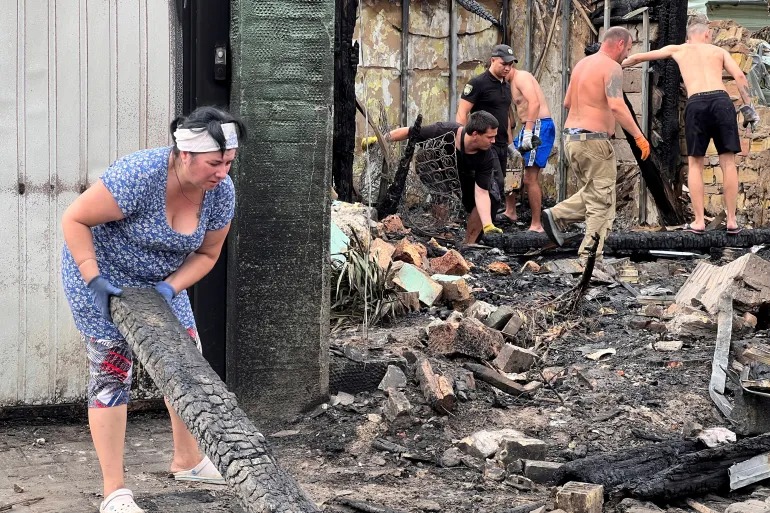As the Russia-Ukraine conflict presses on into its 554th day, fresh waves of violence and diplomatic maneuvers continue to reshape the narrative of this long-standing feud. From a devastating drone and missile assault on Kyiv to cross-border attacks and international talks, the situation remains fluid and the implications are far-reaching.
Unprecedented Assault on Kyiv
In a shocking turn of events, Kyiv, the capital of Ukraine, faced a devastating blow as a “massive” Russian drone and missile attack claimed the lives of at least two individuals and left two others injured. This brutal onslaught, involving over two dozen Russian cruise missiles and 15 drones, drew condemnation from Ukrainian officials who characterized it as a deliberate attack on civilians. The precision and scale of the attack raise questions about the intent behind such a ruthless act of aggression.
Escalation Spreads Beyond Borders
The conflict’s impact has extended beyond Ukraine’s borders as Ukrainian drones launched an offensive on western Russia, targeting multiple regions. Russian sources confirm that at a military airbase in Pskov, significant damage was inflicted on four Il-76 transport aircraft, a cornerstone of the Russian military. The extent of the damage, including two aircraft erupting in flames, underscores the growing intensity of the conflict and the ever-present threat of escalation.
Diplomacy and Disinformation
Amid the chaos, diplomatic initiatives and disinformation campaigns are shaping the narrative of the conflict. Russia’s foreign ministry announced discussions between Foreign Minister Sergey Lavrov and Turkish counterpart Hakan Fidan regarding an alternative to the now-defunct Black Sea grain deal. This proposal could influence the distribution of critical resources, impacting the regions most in need. Meanwhile, a concerning independent study reveals that social media giants, including platforms renamed “X” by Elon Musk, failed to effectively counter Russian disinformation during the initial year of the invasion. The study warns of the growing influence of Kremlin-backed accounts, partly fueled by lax safety standards.
Shift of Power and Loyalties:
The conflict has brought about significant shifts in alliances. Poland, a steadfast supporter of Ukraine, showcases its commitment by establishing a “Russian influence” panel. This move, although raising concerns at the international level, underscores Poland’s unwavering stance against Russian aggression.
Vatican’s Complex Relations:
The Vatican’s involvement takes a curious twist as it confronts the legacy of Russian imperialism. After Pope Francis praised the Russian empire’s historical figures, including Peter the Great and Catherine II, Lithuania, a historically embattled region, summoned the Vatican’s top diplomat. The complexities of religion and geopolitics intermingle in the midst of this protracted conflict.
Global Concerns and Regional Support:
International actors continue to voice their opinions. The United States urges restraint as it cautions North Korea against providing weapons that could exacerbate the conflict. Meanwhile, the EU seeks to bolster Ukraine’s defenses by encouraging member countries to increase ammunition orders.
As the Russia-Ukraine conflict enters its 554th day, the unfolding events paint a complex and multifaceted picture. From devastating attacks on Kyiv to diplomatic negotiations and international reactions, the ramifications of this conflict reverberate across multiple domains. The evolving landscape underscores the need for measured responses, diplomatic ingenuity, and a commitment to safeguarding the lives and well-being of those affected by the ongoing strife.















